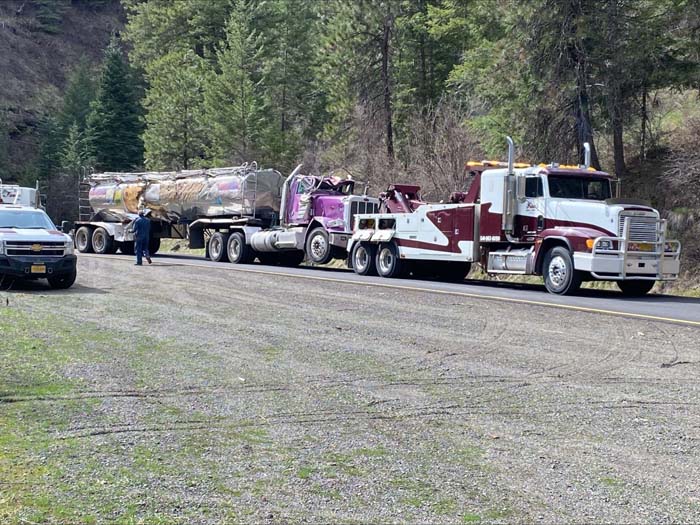More than 25,000 chinook salmon die in truck crash outside Elgin
Published 3:00 pm Tuesday, April 2, 2024

- Lookingglass_Fish_Tanker_Trailer_Rig_with_Tow_Truck.jpg
LA GRANDE — A tanker truck carrying about 102,000 spring chinook salmon smolts crashed near the Lookingglass Hatchery, about 20 miles north of Elgin, on March 29.
Trending
The driver, who works for the Oregon Department of Fish and Wildlife, sustained minor injuries, according to a press release from the agency.
The 53-foot-long truck, hauling the young salmon for release in the Imnaha River, overturned on a sharp corner, went over a rocky embankment and rolled onto its roof.
About 77,000 smolts went into Lookingglass Creek, which flows beside the road, but the remaining 25,500 or so died.
Trending
“We are thankful the ODFW employee driving the truck was not seriously injured,” said Andrew Gibbs, ODFW fish hatchery coordinator for Eastern Oregon. “This should not impact our ability to collect future brood stock or maintain full production goals in the future.”
The Union County Sheriff’s Office responded immediately and assisted with on-scene assessments and vehicle recovery operations. Small amounts of diesel fuel were quickly contained and did not result in a hazardous material spill response, according to the press release.
Lookingglass Hatchery, which is north of Elgin, raises spring chinook as part of hydropower mitigation under the Lower Snake River Compensation Plan, for tribal and sport harvest, and to supplement the wild population on the Imnaha which is listed as threatened.
The smolts lost represent about 20% of the total that will be released into the Imnaha River this year. Fishery managers expect to see about 500 to 900 fewer adult fish returning in 2026 and 2027 due to the loss. The 77,000 fish that made it into Lookingglass Creek will likely return there and produce approximately 350 to 700 additional adults.
ODFW also notified fishery co-managers, the Nez Perce Tribe (NPT), and the Confederated Tribes of the Umatilla Indian Reservation (CTUIR) when the incident occurred. NPT staff responded and provided additional assistance by helping to collect, count and scan dead fish for PIT tags (Passive Integrated Transponders). Information collected from PIT tags, including those that weren’t released, will help ensure the best possible estimates of survival and future adult returns.









